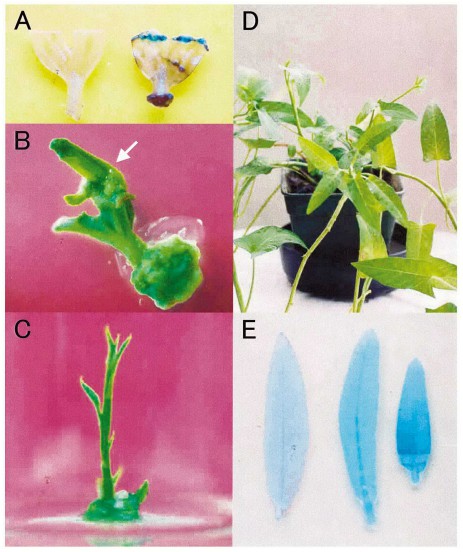Ipomoea comprising at least 600 species is the largest genus in Convolvulaceae. Both water spinach (Ipomoea aquatica) and sweet potato (Ipomoea batatas) belong to Ipomoea and are the only two food crops in Convolvulaceae. Water spinach is an amphibious, sprawling herb containing a milky white sap. It is rich in carbohydrates, dietary fiber, minerals, vitamin C, and all essential amino acids. Due to its high nutritional value, it is considered one of the most essential vegetables in Southeast Asia. Water spinach also has important medicinal value. In addition, due to its rapid growth and efficient absorption of various substances, it is believed to be used to isolate environmental pollutants and provide a source of medical materials.
 Fig. 1. Transformation of Ipomoea aquatica. (Khamwan K, et al, 2003)
Fig. 1. Transformation of Ipomoea aquatica. (Khamwan K, et al, 2003)
Lifeasible is an industry leader in the field of plant genetic transformation and is proud to offer cutting-edge genetic transformation services for Ipomoea aquatica. Water spinach genetic transformation faces unique challenges, largely due to its limited genomic information and lack of established transformation methods. Our experts develop innovative approaches to overcome these obstacles, ensuring efficient gene delivery, stable integration, and sustained expression of exogenous genes.
We utilize cutting-edge technologies, particularly Agrobacterium-mediated transformation methods. By evaluating various factors, such as bacterial cell density, growth period, and acetosyringone concentration, we provide a robust transformation protocol for Ipomoea aquatica. By infecting cut cotyledons with Agrobacterium tumefaciens bearing the GUS gene as a model, we establish a stable transformation system.
We provide polymerase chain reaction (PCR) analysis and histochemical analysis of reporter genes, such as the GUS gene, to carefully assess the presence and activity of the introduced gene. By evaluating the phenotypic and growth performance of transgenic plants, we validate the stability and efficiency of the genetic transformation of water spinach.
Lifeasible provides comprehensive genetic transformation services for Ipomoea aquatica. By improving crop quality, promoting environmental remediation, and exploring new pharmaceutical applications, we strive to positively impact agriculture and human health. If you are interested in our solutions, please contact us for technical consultation and quotation.
Reference:
Lifeasible has established a one-stop service platform for plants. In addition to obtaining customized solutions for plant genetic engineering, customers can also conduct follow-up analysis and research on plants through our analysis platform. The analytical services we provide include but are not limited to the following:
Get Latest Lifeasible News and Updates Directly to Your Inbox
Adaptive Evolutionary Mechanism of Plants
February 28, 2025
Unraveling Cotton Development: Insights from Multi-Omics Studies
February 27, 2025